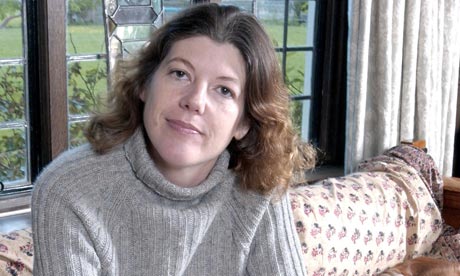
A number of British literary institutions are in states of dramatic change, thanks to commercial and technological pressure. The Orange prize, which is now looking for a new sponsor, is one. Granta is another. Three years ago, the magazine's generous and public-spirited proprietor, Sigrid Rausing, propelled her journal into a new orbit, with a new team and a bold mission statement. "We cannot in good conscience pretend," declared Granta redux, "that an Anglo-American dialogue is at the heart of our cultures."
Three years on, what do we find? The latest issue of Granta is titled Britain, inspired by the success of a Chicago edition in 2009. What better time to revisit the mystery of this ex-Cambridge "little magazine".
I went to visit Sigrid Rausing, at home in Notting Hill, for an update on her mission. It turned out to be an object lesson in the iron law of unintended consequences. First of all, this literary journal, with offices in London and New York, far from turning its back on "Anglo-American dialogue", has taken it to the max. In contrast to the picayune conventions that usually bedevil transatlantic co-publishing, Rausing has consolidated both US and UK editions into a unified version for a global market.
From this secure base, Granta is stealthily remodelling itself into a global brand. Rausing spoke proudly of her Spanish, Bulgarian, Portuguese, Norwegian, Swedish and (with Shanghai 99) even Chinese co-publications. A Greek Granta, unsurprisingly, has gone to the wall. However, for an annual fee, other foreign editions can participate in the Granta programme. This transformation has been conducted without hype or fanfare. It is, moreover, a transition that's eloquent of the opportunities for innovation in books and magazines in the digital age. A number of things stand out from Rausing's direction of her magazine.
First, Granta has turned its back on the gospel of "free content". In addition to its co-editions, it sells itself across at least four platforms: print, ebook, app and website. In the 1980s, when the magazine, edited by Bill Buford, was a must-read publication for a whole generation, print runs were said to touch 75,000. Those halcyon days are gone. Granta now claims to sell about 50,000 copies; a mix of subscription and over-the-counter sales. The electronic contribution, however, more than compensates for any shortfall.
Second, every edition, especially in Britain, is geared to local events. "Each issue becomes a kind of mini-festival," says Rausing. It's a paradox of the digital age that a printed magazine should inspire these one-off live conjunctions of writers and readers. As with hardback books, we find that the virtual edition browsed online becomes a kind of digital trailer for the deeper and more satisfying experience of the text in performance and on the printed page. The marriage of e- and non-e validates the former and bankrolls the latter. It's this vision of a global audience that, I understand, animates Kate Mosse and the fiction prize formerly sponsored by Orange.
These are said to be difficult times for the printed word. The literary community often seems to be in a demoralised funk. But I came away from my conversation with Ms Rausing in an optimistic mood.
Where before there was loose talk about "the cognitive friction of juxtaposition", there is now commercial clarity and basic editorial discipline. The Britain issue of Granta not only offers excellent contributions from Robert Macfarlane and Mario Vargas Llosa, it also contains a well-designed mix of fiction and non-fiction, poetry and photographs. All this is available, in different formats, to an international audience.
Three years ago, Granta was complaining that the literary journals of the past were "a closed circuit, a club". Maybe so. What's not in doubt is that the IT revolution has wrenched open the doors of the club and plugged the closed circuit into the international mains. For Orange and Granta, the voltage of a global audience, exploiting a powerful Anglo-American symbol, is the key to cultural renewal. These may be difficult times for print, but the landscape is becoming less murky and confusing. Some of the clouds have silver linings and, westwards, the land is bright.
The future's bright, even if it's not Orange
The book trade, predictably, has reacted with shock and horror at Orange's decision to pull out of sponsoring the international fiction prize that, for the past 17 years, has promoted its name .
My view is that Orange's defection to the world of film may prove a blessing in disguise. Across the English-speaking world, "Orange fiction" has become a shorthand for important new novels by talented contemporary writers who might have otherwise escaped notice. Any list of winners that includes Barbara KIngsolver, Marilynne Robinson, Rose Tremain, Helen Dunmore, Chimamanda Ngozi Adichie, Andrea Levy, Ann Patchett and Kate Grenville demonstrates how effortlessly Orange has come to challenge Man Booker and Costa in the literary prize stakes.
Furthermore, assuming Kate Mosse (co-founder) and her team secure new backers, they should be in a position to exploit the truly international ambitions of the prize and break away from the funky but slightly offbeat appeal of Orange. Plus, at a few quid shy of £500,000 per annum, taking on the prize won't break the corporate bank.
I confidently predict a new sponsor very soon.
Jamaica calling
Calabash, the Jamaican literary festival, will celebrate 50 years of the island's independence this weekend on Treasure Beach. Justine Henzell, the co-founder, has brought together some of the biggest names on the Jamaican literary scene, including Olive Senior and Alecia McKenzie. "Jubilation! 50" will also showcase performances by Anis Mojgani and "fifty-two living poets". Festivals don't get much hotter or more jubilant.

